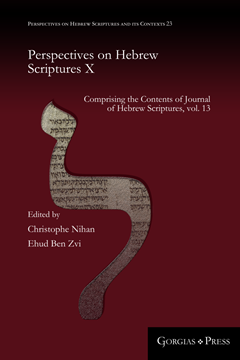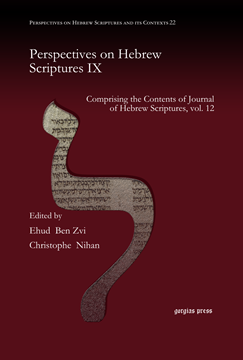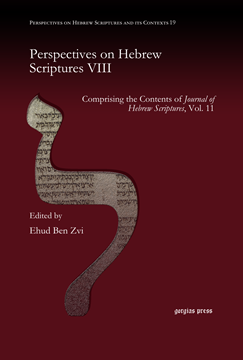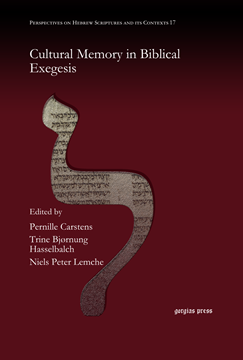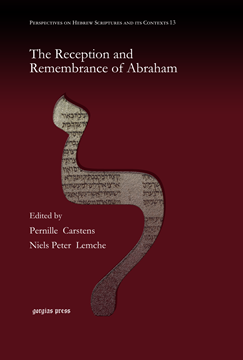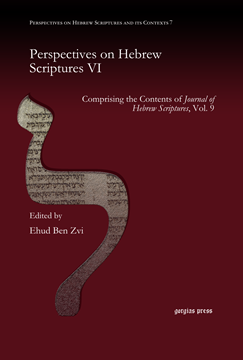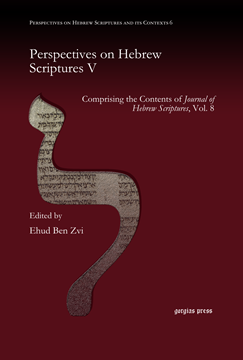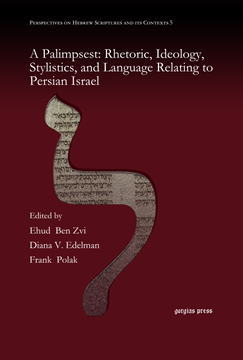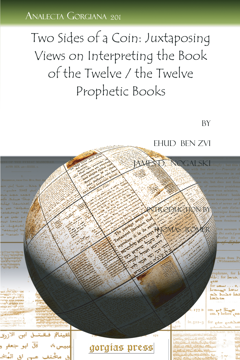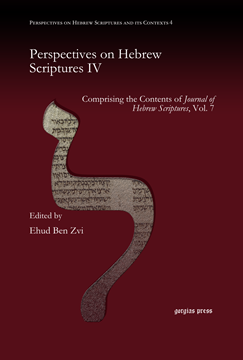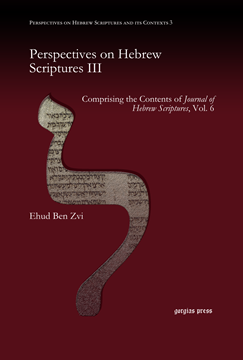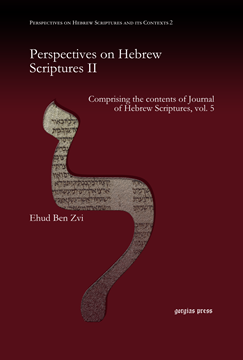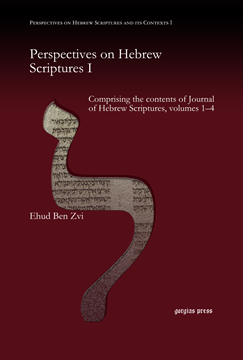Ehud Ben Zvi

Ehud Ben Zvi is a professor in the Dept. of History & Classics at the University of Alberta. He has authored or (co)-edited about twenty volumes and written numerous essays primarily on ancient Israel, its intellectual history, social memory, historiography, and prophetic books.
Perspectives on Hebrew Scriptures X
Comprising the Contents of Journal of Hebrew Scriptures, vol. 13
Edited by Christophe Nihan & Ehud Ben Zvi
ISBN: 978-1-4632-0691-8
This volume incorporates all the articles and reviews published in volume 13 (2013) of the Journal of Hebrew Scriptures.
$251.00 (USD)
Perspectives on Hebrew Scriptures IX
Comprising the Contents of Journal of Hebrew Scriptures, vol. 12
Edited by Ehud Ben Zvi & Christophe Nihan
ISBN: 978-1-4632-0420-4
This volume incorporates all the articles and reviews published in volume 12 (2012) of the Journal of Hebrew Scriptures.
$287.00 (USD) $172.20 (USD)
Perspectives on Hebrew Scriptures VIII
Comprising the Contents of Journal of Hebrew Scriptures, Vol. 11
Edited by Ehud Ben Zvi
ISBN: 978-1-4632-0220-0
This volume incorporates all the articles and reviews published in Volume 11 (2011) of the Journal of Hebrew Scriptures.
$278.00 (USD) $166.80 (USD)
Cultural Memory in Biblical Exegesis
ISBN: 978-1-61719-165-7
Cultural memory is the shared reproduction and recollection of what has been learned and retained, normally treated as “the cultural heritage”. The purpose of this book, the first product of the research program Cultural Memory in Biblical Exegesis, is to study how memory is inscribed and embodied in biblical culture and its surrounding area. The essays in this volume seek to open new investigations into cultural memory in biblical and cognate studies, and to include a plethora of methods and perspectives such as the relationship between cultural memory approach and post-colonialism, globalism and epistemology.
$208.00 (USD) $124.80 (USD)
Perspectives on Hebrew Scriptures VII
Comprising the Contents of Journal of Hebrew Scriptures, Vol. 10
Edited by Ehud Ben Zvi
ISBN: 978-1-4632-0165-4
This volume incorporates all the articles and reviews published in Volume 10 (2010) of the Journal of Hebrew Scriptures.
$298.00 (USD) $178.80 (USD)
The Reception and Remembrance of Abraham
ISBN: 978-1-4632-0054-1
This book explores the role of the biblical patriarch Abraham in the formation and use of authoritative texts in the Persian and Hellenistic periods. It reflects a conference session in 2009 focusing on Abraham as a figure of cultural memory in the literature of these periods. Cultural memory is the shared reproduction and recalling of what has been learned and retained. It also involves transformation and innovation. As a figure of memory, stories of Abraham served as guidelines for identity-formation and authoritative illustration of behaviour for the emerging Jewish communities.
$161.00 (USD) $96.60 (USD)
Perspectives on Hebrew Scriptures VI
Comprising the Contents of Journal of Hebrew Scriptures, Vol. 9
Edited by Ehud Ben Zvi
ISBN: 978-1-61143-004-2
This volume incorporates all the articles and reviews published in Volume 9 (2009) of the Journal of Hebrew Scriptures.
$321.00 (USD) $192.60 (USD)
Perspectives on Hebrew Scriptures V
Comprising the Contents of Journal of Hebrew Scriptures, Vol. 8
Edited by Ehud Ben Zvi
ISBN: 978-1-60724-326-7
This volume incorporates all the articles and reviews published in Volume 8 (2008) of the Journal of Hebrew Scriptures.
$268.00 (USD) $160.80 (USD)
Rhetoric, Ideology, Stylistics, and Language Relating to Persian Israel
ISBN: 978-1-60724-584-1
A volume of collected essays that explores what we can learn about the producers and readers of biblical books by looking into matters of language, rhetoric, style, and ideology. What do they teach us about these literati’s world of knowledge and imagination, about the issues they had in mind and the ways they came to deal with them through authoritative literature? The book includes essays on such issues as whether linguistic theories can solve literary-critical problems, on what is “late biblical Hebrew,” on parallelism and noun groups in biblical poetry, and the communicative meaning of some linguistic choices.
$197.00 (USD) $118.20 (USD)
Juxtaposing Views on Interpreting the Book of the Twelve / the Twelve Prophetic Books
Series: Analecta Gorgiana 201
ISBN: 978-1-60724-303-8
A conversation between James D. Nogalski and Ehud Ben Zvi on the question of The Twelve, its implications for the historically oriented study of the prophetic books in the Hebrew Bible, and for the reconstruction of the intellectual history of ancient Israel.
$54.00 (USD) $32.40 (USD)
Perspectives on Hebrew Scriptures IV
Comprising the Contents of Journal of Hebrew Scriptures, Vol. 7
Edited by Ehud Ben Zvi
ISBN: 978-1-59333-920-3
This volume incorporates all the articles and reviews published in Volume 7 (2007) of the Journal of Hebrew Scriptures.
$242.00 (USD) $145.20 (USD)
Perspectives on Hebrew Scriptures III
Comprising the Contents of Journal of Hebrew Scriptures, Vol. 6
By Ehud Ben Zvi
ISBN: 978-1-59333-976-0
This volume incorporates all the articles and reviews published in Volume 6 (2006) of the Journal of Hebrew Scriptures.
$227.00 (USD) $136.20 (USD)
Perspectives on Hebrew Scriptures II
Comprising the contents of Journal of Hebrew Scriptures, vol. 5
By Ehud Ben Zvi
ISBN: 978-1-59333-612-7
This volume incorporates all the articles and reviews published in Volume 5 (2004-2005) of the Journal of Hebrew Scriptures.
$268.00 (USD) $160.80 (USD)
Perspectives on Hebrew Scriptures I
Comprising the contents of Journal of Hebrew Scriptures, volumes 1–4
By Ehud Ben Zvi
ISBN: 978-1-59333-310-2
This volume incorporates all the articles and reviews published in Volumes 1-4 (1996-2003) of the Journal of Hebrew Scriptures.
$318.00 (USD) $190.80 (USD)

